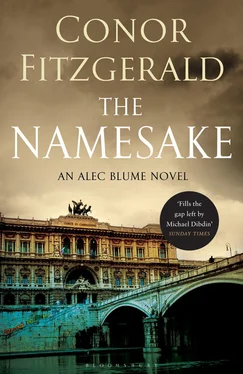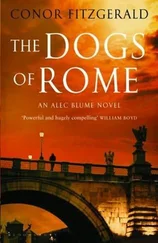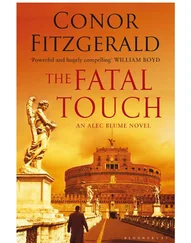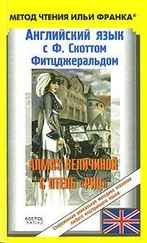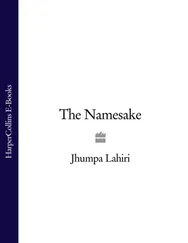Conor Fitzgerald - The Namesake
Здесь есть возможность читать онлайн «Conor Fitzgerald - The Namesake» весь текст электронной книги совершенно бесплатно (целиком полную версию без сокращений). В некоторых случаях можно слушать аудио, скачать через торрент в формате fb2 и присутствует краткое содержание. Жанр: Полицейский детектив, на английском языке. Описание произведения, (предисловие) а так же отзывы посетителей доступны на портале библиотеки ЛибКат.
- Название:The Namesake
- Автор:
- Жанр:
- Год:неизвестен
- ISBN:нет данных
- Рейтинг книги:3 / 5. Голосов: 1
-
Избранное:Добавить в избранное
- Отзывы:
-
Ваша оценка:
- 60
- 1
- 2
- 3
- 4
- 5
The Namesake: краткое содержание, описание и аннотация
Предлагаем к чтению аннотацию, описание, краткое содержание или предисловие (зависит от того, что написал сам автор книги «The Namesake»). Если вы не нашли необходимую информацию о книге — напишите в комментариях, мы постараемся отыскать её.
The Namesake — читать онлайн бесплатно полную книгу (весь текст) целиком
Ниже представлен текст книги, разбитый по страницам. Система сохранения места последней прочитанной страницы, позволяет с удобством читать онлайн бесплатно книгу «The Namesake», без необходимости каждый раз заново искать на чём Вы остановились. Поставьте закладку, и сможете в любой момент перейти на страницу, на которой закончили чтение.
Интервал:
Закладка:
‘Give me a bit of time,’ said Blume. ‘It’s still not my priority and I think it might be an ill-advised visit.’
‘It almost certainly is, but you shouldn’t have started this thing. Just check. You don’t have to go in. Check from a distance, bring backup from the town. Has anyone spoken to the local magistrate yet?’
‘I don’t know… Listen, Caterina, I was thinking maybe… no never mind.’
‘Thinking what, Alec?’
‘Nothing. I was thinking nothing. It’s nice to hear your voice.’
He hung up before she could reply to that.
He followed the directions of the woman in the Mercedes, replaying her voice in his head. There was something about the accent of Calabria that seemed to imply that the speaker was engaged in two streams of communication, one literal, the other ironic. The Sicilians did it, too, but here it was even more pronounced. No matter how innocuous the subject matter, the Calabrians seemed to be delivering an underlying commentary on the person being spoken to for failing to recognize that the whole idea of speaking Italian was faintly ridiculous. If only the person being spoken to would switch into the local dialect based on Greek, Latin, Albanian, Arabic and Norman French, they seemed to be suggesting, things would be much clearer. Or maybe it was speaking at all that they found ridiculous, when so much about life and the past was better left unsaid.
The feeling of being watched was so strong that he felt if he were to make a wrong turning someone might step out of the bushes and redirect him. But to what?
The road, already so narrow that the Spanish broom was clutching at the wheels, simply vanished ten yards after the turn. A few yards into the field and he could feel the wheels sinking into the sand beneath the scrub, and from where he was, he could already see that the land suddenly dropped away into a narrow gorge. Seeing he could no longer go forwards, he reversed the Range Rover back to the edge of the field and walked. By now he knew what he would see.
The soil beneath his feet was grey and powdery, and the smell that reached his nose was of wet ash and burned rubber, even more pungent than the smell he and Konrad had experienced together near Lake Avernus. As he reached the edge of the shallow gully, he saw the blackened hulk of the burned-out camper van lying at the bottom of the deep ditch. The back section was jutting halfway up the slope, and the driver’s cab was buried in a pool of greasy mud at the bottom, like the nose of some sea creature stranded by the tide.
He had a weapon, but it was a handgun, no use against hidden enemies at a distance who had the drop on him. He had a phone, which, when he took it out to call in backup, flashed a little antenna at him to impart the unsurprising news that there was no mobile phone signal in this dimple of wasteland on the outskirts of Locri. The car had a radio, but, he felt sure, there would be people waiting for him at the car, and in any case it was his duty now to clamber down to the ditch and put his head into the black gap where the curtain to the living space in the camper had been and to look inside.
The smell of the charred materials was overpoweringly sour, but, he realized with relief, there was no smell of burned hair and teeth, none of the sweet porchetta smell of roasted human. Wherever Konrad was, and he might be lying somewhere in the ditch below, at least he was not in the camper, which, even in the hot air of the late afternoon, was still radiating heat. After hunting around for ten minutes and finding no trace of Konrad, alive or dead, Blume resolved to climb into the camper van. Years of experience had taught him to control his gag reflex, but the evil smells from the burned-out wreck were no less overpowering for that. They entered his nostrils and mouth and seemed to stream into his brain through his eyes and ears. With the inevitability of a digital timer, the migraine went off in his head, obscuring his vision. He clambered through the burned-out door, becoming immediately filthy as he gripped the flaking walls to steady himself against the steep incline. Inside it was as if someone had spent the day burning fat wads of newspaper and scattering the pieces around. A scorched piece of crumpling wood was all that was left of the partition between the living quarters and the cab. There was no trace of the photo of Dagmar.
In the corner, blistered and bulging, as if it had been blown open from the inside, sat his father’s suitcase. It had not put up much of a fight against the fire. Blume lifted off what was left of the lid, saddened to find that the shiny shellac-covered case his father had been so fond of had consisted mainly of compressed layers of corrugated cardboard. Nothing inside had survived except for an unwieldy Aran sweater that he had always hated but had kept all these years in memory of his mother who said he would be thankful for it when they moved back to cold Seattle. As he lifted it out, he noticed that some of the threads on the sleeve were still glowing slightly in the dark, like tiny electric filaments. The pictures and sketches from his parents’ study, some of them valuable, all of them precious, were gone. The books were all burned halfway in from their sides or else halfway down from the tops. His socks, underpants and polo shirts had melted. As he was rummaging through the mess, the charred sides of the suitcase gave way. For a moment, the incinerated contents retained a rectangular shape, then subsided with a puff of ash, which wafted into his face. He reached his hand down into the heap of clinker that had once held the most valued objects of his life and scooped up the warm shards of an exploded cup. He sieved them through his fingers and then repeated the operation, over and over again. Half an hour later, he emerged from the vehicle, clutching a blackened engagement ring and two misshapen wedding bands in his fist. The air, which had seemed so hot and hostile before, cooled his face. He filled his lungs and expanded his chest and, sob by sob, heaved in oxygen until he was breathing normally.
When he reached the car, he noticed that it seemed lopsided. He soon discovered the cause. Two tyres had been slashed. Not all four, because two was just one more than the available spare, and therefore the more exquisite an act of intimidation. He hardly cared. He opened the door and got a bottle of water that he had seen in the back seat. It was warm and had been half drunk by God knows whom, but took the madness out of his thirst. He wiped his face with his black hands and looked at the results in the mirror. He started the engine and reversed, not bothering to look backwards into the glare of the sun. The Range Rover wobbled and swayed, and the wheels behaved like wooden cubes rather than flat rings. He shoved it into forward gear and headed back towards Via Garibaldi. He found that if he went faster, the car maintained a linear trajectory for longer, and so he pushed down on the accelerator. The sound from underneath the car, echoed and amplified by the walls on the side of the road, was like the rotor blades of a helicopter. He stepped down harder on the gas and the car began sliding unstoppably into the opposite lane where another car, whose driver was either playing chicken with him or texting what might be his last ever message on his phone, continued its head-on approach. Blume pulled at the wheel and aimed at a jagged pothole on his own side. The other car went sailing by and, with a crunch and a pop, his front left tyre disintegrated. The car lurched forwards, showering sparks and making a scraping noise on the asphalt which seemed to electrify every tooth filling in his head and make his balls contract.
Blume gave up. He kicked his way out of the car, even though nothing was wrong with the door, and stepped down into the dingy street, and started walking. Fifty yards ahead of him was a Sidis mini-mart, closed, and after that, on the left, was his inevitable destination, a modest two-storey house with a red gate.
Читать дальшеИнтервал:
Закладка:
Похожие книги на «The Namesake»
Представляем Вашему вниманию похожие книги на «The Namesake» списком для выбора. Мы отобрали схожую по названию и смыслу литературу в надежде предоставить читателям больше вариантов отыскать новые, интересные, ещё непрочитанные произведения.
Обсуждение, отзывы о книге «The Namesake» и просто собственные мнения читателей. Оставьте ваши комментарии, напишите, что Вы думаете о произведении, его смысле или главных героях. Укажите что конкретно понравилось, а что нет, и почему Вы так считаете.
